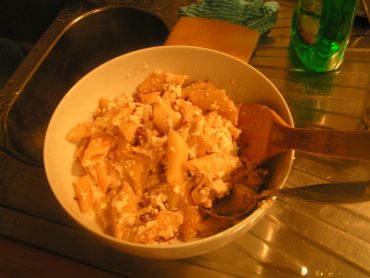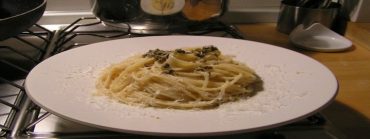Literary Recipe (The Pasta Papers): Stephen Hawking’s Carbonara
Contain an incredibly large, dense mass in your kitchen. Hide it behind a door that says ‘loo’ or ‘bathroom’. Invite a dumb undergrad over, (any faculty will do though economics would be preferable,) telling him or her you want them to take part in a revolutionary experiment. When he gets to your house, have him sit down and then slowly explain to him about black holes. (Don’t worry if you make a mistake or two. He’s dumb, so he’ll never know the difference.) Pour him plenty of beer as you do. When he asks to use the loo, show him to the door behind which you’ve hidden the black hole – but remember to give him the pasta dough before he steps inside.




